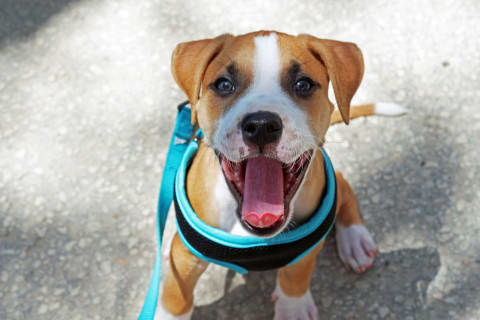Training Your New Dog
While mischievous puppies can be amusing, if you want your new puppy to develop into a well-behaved, friendly and obedient dog, training your puppy is a crucial step.
In order to help your new fur-baby be the best dog they can be, training needs to begin early and stay positive. Here's more advice on how to raise a happy, healthy and well behaved dog:
Choose Your Puppy's Name Wisely
You will be using your dog's name a lot over the coming days, months and years, so try to pick a name that's short and easy to call out. Names with a strong ending that can be emphasized can also help to catch your puppy's attention when you are calling them.
Remember that Your Puppy is Just a Baby
If you have become the owner of a puppy, chances are that your fur-baby is just a few weeks old. When training your puppy, be sure to adjust your expectations accordingly.
Puppy-proof Your House
Baby gates, dog crates or pens can help you to keep your new dog out of trouble. Whenever your puppy isn't being directly supervised, be sure to restrict them to a suitable safe place. Giving your dog appropriate safe toys to chew can also help to them occupied while you aren't with them, and prevent destructive chewing. By proactively eliminating opportunities for accidents and bad behavior you can help your pet to get through the mischievous puppy-phase without forming bad habits.
Teach Your Dog to Come When Called
Teaching your dog to come when called is the first command that needs to be mastered. To help teach your puppy to come, get down to puppy level and, using their name, call them (ie: come Jack). When your puppy obeys, make a really big deal using lots of positive reinforcement. Continue practicing this skill in different situations, such as when your puppy is busy with something else, or when there are other people around. To reinforce the importance of this command, never punish your dog when they come to you. Even if they have been behaving badly, call your dog in a happy, playful tone and reward big when he gets to you.
Discourage Nipping or Biting
Rather than scolding, a great way to deter puppy nipping and biting is to pretend that you're in pain when they bite at you. Your pet will likely be surprised at having hurt you and immediately stop. Offering your puppy a chew toy in place of your hand, shoe, or pant leg can help to stop the behavior and teach your puppy what they are allowed to chew on.
Sign-up For Puppy Classes
Puppy classes will help your pet become accustomed to paying attention to you, while being around other people and animals. Look for puppy classes that are being offered at time and location that is easy for you to attend, so that classes are fun and instructive. These classes will teach you work with your puppy in a positive manner while teaching your puppy basic commands.
Stay Positive
When training your dog avoid scolding and reward good behavior. Positive reinforcement tells your puppy when they are getting it right, so that they can understand how you want them to behave. Reward your dog's good behavior with positive reinforcement such as treats, toys, heaps of praise, and lots of pats.
Use 'High Value' Treats When Training
Just like people, dogs love to nibble on extra-special foods. While everyday packaged dog treats are great for regular training, your dog will likely work much harder for a tiny piece of real cheese or chicken breast, than store-bought treats. This is a great tip for training big dogs as well as puppies! 'High-value' treats are particularly helpful when training your dog in busy location or when teaching a skill that is especially challenging.
If you'd like more advice on how to train your new dog, contact our Bartlett vets today to book a consultation for your new fur-baby.

Looking for a vet in Memphis?
We're always accepting new patients, so contact our veterinary hospital today to book your pet's first appointment.Related Articles View All
Heimlich Maneuver For Dogs: What To Do If My Dog Is Choking
What should you do if something gets lodged in your dog's throat and they begin to choke? Here, you will find helpful information on the Heimlich maneuver for dogs and what to do if your dog is choking.
Signs That Your Dog May Have a Cavity
Can dogs get cavities? What are the signs of cavities in dogs? In today's post, you will find the answers to these dog cavity questions and more.
Chipped Tooth in Dogs - What to Do if Your Dog Has a Broken Tooth
Dogs often experience chipped or fractured teeth. Is a broken dog tooth an emergency? It might be. Today's post contains information about broken teeth in dogs and what to do about dog tooth fractures.
Large Dog Care & Saving Money with Wellness Plans
What do large and giant breed dogs need to stay healthy and happy? Here, we provide vital information on how to proactively care for your giant or large dog's health and save money along the way.
